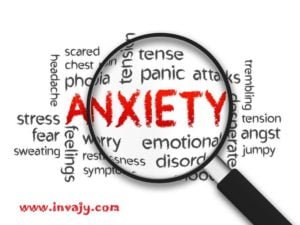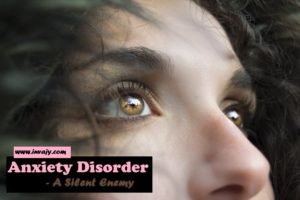Anxiety Disorder- A Silent Enemy
Anxiety disorder involves persistent, excessive worry or fear that interferes with daily life. Managing it involves therapy, medication, and coping strategies to regain control and improve well-being.

You must have felt anxious at one or another point of time before crucial events in life. The anxiety may give you a boost of energy or help you focus. But an anxiety disorder is not tied to any specific event. Even when it is related to a specific event, the anxiety is out of all proportion to the crisis. It is very intense and does not dissipate after the crisis is resolved. In this articles we will be discussing anxiety meaning, types of anxiety disorders, anxiety symptoms and causes of anxiety disorders. It will give an overall picture what anxiety is all about.
What is Anxiety?
Anxiety is basically your body’s natural response to stress. It’s a feeling of fear or apprehension about what is about to happen or about to come. A visit to doctor of diagnoses of illness, first day of school, appearing in a job interview, or giving a public speech may cause most people to feel nervous and fearful.
What are the most common anxiety disorders?
Anxiety Disorders are the most common mental illness across the globe. Globally an estimated 275 million people suffer from an anxiety disorder, making it the most prevalent mental health or neurodevelopmental disorder. In the United States of America, it’s affecting around 40 million people and approximately 38 million Indians suffer from It.
Anxiety comes in many garbs: worries, fears, dread, uneasiness, premonitions, phobias and feelings of hopelessness and helplessness. The person is beset by negative thoughts to such an extent that his whole life is disrupted-afflicting his body and mind. Generalized Anxiety Disorder (GAD), Social Anxiety, Specific Phobias, Panic Disorder, Obsessive Compulsive Disorder (OCD) and Post Traumatic Stress Disorder (PTSD) are few most common anxiety disorders.
Anxiety Symptoms
- The person remains quiet and withdrawn most of the time
- His/her sleep and appetite are disturbed
- Does not wish to do anything
- Remain tensed most of the time
- Increased heart rate
- Rapid breathing and pulse
- Sweating
- Dry mouth
- Aches and pains
- Gastric problems
- Restlessness
- Trouble in concentrating
If most of these symptoms persist continuously for more than two weeks then an Anxiety Disorder could be the likely cause.

Our brain is wired for self-preservation. Whenever a threat is perceived energizing hormones like Adrenalin and cortisol spurt in the body, readying it to fight or flee. We take appropriate action, the energy is used up and the hormones return to their normal levels. But if the threat is imaginary this surplus energy persists in the body making the mind alert, the muscles taut, the heart racing and the eyes wide open. No wonder the person feels edgy and cannot sleep. The more distressing the emotions the higher the state of unrest.
Causes of Anxiety Disorder
Research has been unable to nail down any single cause of anxiety disorders. It is mostly an amalgam of psycho-social-biological factors or painful life events.
Genetic
A propensity to a mental disorder is sometimes passed through genes but if someone so affected is raised in a positive environment he can successfully overcome grave challenges; while even a person without such predisposition can come down with an anxiety disorder if the stress is enormous.
Environment
The environment in which a child grows, the kind of rearing he receives, has a tremendous influence on his psyche. If he is ridiculed and tormented at every turn his mental health will show some scars. His experiences at school or playground too will make him positive and wholesome if they are good but cause emotional problems if they are not. School anxiety is growing mental disorder in children going school. Even in the case of adults, a toxic social or working environment can cause excessive anxiety. A lot depends upon that person’s ability to tolerate stress.

Also Read: World Mental Health Day: How to maintain good mental health and well-being?
Traumas
Tragedies like the loss of a loving person, job and property sadden everyone but a person who is mentally strong and positive and has the support of loving people will recover without falling into an anxiety disorder. Painful experiences like rape and abuse too cause a lot of anxiety.
Diseases
Diseases like cancer, cardiovascular problems and hypothyroid also entail anxiety in some people.
Psychological Factors
Quite often the cause of anxiety lies not in external factors, but one’s own psychology. That is why some people remain anxious most of the time even when there is no problem in their lives. Their faulty thinking cooks up a soup for them. For example someone who has a habit of making a mountain out of a mole he/she will shudder at every new development. Or those who maximize the severity of a challenge and minimize their own ability to overcome it also remain tense. There is another cognitive distortion known as ‘filtering’ which denotes ignoring the good things if life and focusing only on the painful aspects. Those who overthink about every issue also incur a lot of anxiety.
Chemical Changes in Brain
Another important cause of anxiety is imbalance in brain chemicals. If there is an abundance of hormones like Adrenalin and paucity of good chemicals like serotonin, oxytocin and endorphins, anxiety results.

These are the causes, but what about the remedy?
Well, it demands a separate post. We will be sharing article on how to deal with anxiety disorder in our future posts.
If you have liked this article please share it with your friends and relatives on your favorite social media websites/apps.







My brother suggested I would possibly like this website. He was entirely right.
This put up truly made my day. You cann’t believe simply how so much time I had spent for this information!
Thank you!